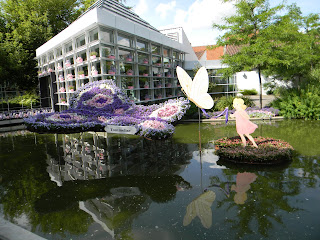Hans Christian Andersen's Hus (house)
Hans Christian Andersen's "Thumbelina" (or "Tommelise" in Danish)
"To travel is to live" is a famous quote by Hans Christian Andersen which basically described today and this whole week for me. The day was spent traveling from Tomas' house in Northern Jutland, Nr Halne, all the way back to Nykøbing. On the way, we stopped in Odense, which is where Hans
Christian Andersen was born and called his home all his life. It is the third largest city in Denmark,
and you would never actually know. It is beautiful, and at the center where his house is, is filled with
only pedestrian streets which are all cobblestone. His house can now be toured and is part of a museum
dedicated to his life and his work.
Magidan and her Swedish lover are buried. It is a long story, but basically follows the star-crossed lovers
tale of Romeo and Juliet, although they were actual people, and they were 21 and 35 and were forbidden
to see each other, and he deserted the Swedish army to run away with her (a Danish dancer).
We then took a ferry from Spodsbjerg (Langeland - actually "long land or island") to Tårs. This was a
huge boat that fit so many cars, and it had an upper deck where you could sit inside or outside and order
food or drinks. Due to the fact that Denmark is composed of over 400 islands, ferryboats are actually a
very common way of travel.
When we were on the ferry, I came to realize just how many windmills there are in Denmark. Just looking out over the coastline, we could count over 30, and I remembered reading in one of the DIS handbooks that wind energy accounts for 20% of all of Denmark's energy, in addition to the burning of waste and collecting the energy from that. In fact, on the way to the ferry, we passed the building for Vesta, the largest windmill company in the world (and it actually has offices in CA also)!
included pork and potatoes along with hot red cabbage) with Søren, Gitte, Claus, Kitte, and
Tomas. It was nice to be able to just be with everyone and share stories of the trip. Also, we were able
to talk about family history which is hard to do when the conversation is from the US to Denmark.
Many Danes (including my family members) speak English very well, but struggle much more when it
comes to actually sitting down and writing it. At the end of dinner (which included dessert and then tea
coffee with candies after it) we took out a map that we bought along our trip and highlighted everywhere
we went and the important things we saw along the way. It is amazing that in five short days, we were
able to see basically all of Denmark, and three of the four largest cities in Denmark.
The Danes take every opportunity they can to sit outside and eat their meals, or at least the tea and coffee
after meals. Because the weather in Denmark is so variable, they take advantage of the good weather
while they have it. I've also learned to expect for breakfast and lunch to consist of bread with some kind
of topping. Its made me decide that it is definitely a good thing I decided to rent a bike while I'm in
Denmark, or I most definitely will be having to buy a new wardrobe!
Today I learned a lot from Tomas about how the education system works in Denmark. All kids go to
school up to 9th grade, and some stay up to 10th grade. After 9th/10th grade, they attend "gymnasium"
which is another three years of schooling similar to our "high school." After that, if grades are high
enough, they can try to go to a University or specialization school where they can learn their trade.
My only other word for the day is færge which means "ferry," and the days of the week which, for the
most part, sound like the English words except for Wednesday, "Onsdag" and Saturday, "lørdag," where
you can tell "dag" is day, so you hear many people saying to each other "god dag" which is "good day."







No comments:
Post a Comment